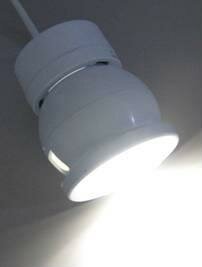Controlled Plasma (CP) lighting technology is the latest of a number of emerging innovative lighting technologies that inadvertently help reduce GHG emission through energy efficiency. In fact its Melbourne inventor Graeme Huon (formerly and acoustics engineer) asserted that “If we were to replace 75 % of lights in homes with these globes in the next five years, we could save building one new power station”.
Cold cathode fluorescent lighting (or CCFL) has been around for a few years in the form of inductive lighting. However, what sets CP globes aside from the rest is that it is the first of its kind to be able to be used in homes as well as for commercial applications due to its affordability and design.
What is a CP globe? Graeme Huon explains: “It is a light source that utilises three existing filament-free light technologies; neon, cold cathode and high intensity discharge along with a new type of controller to regulate the way it works. That way you get flicker-free light and cool running temperatures. It only uses 5 watts, is dimmable and has a lifespan of 20 000 hours”. These together with good colour rendition and with very good light flux levels make it a real alternative to LED lamps and actually surpass CFL lamps in many ways.
To further simplify matters the GU10 globe is incorporated into a downlight fitting (similar in appearance to many existing 50 watt halogen fittings) and is fully sealed to keep out insulation, bugs and heat. This creative downlight is also so versatile that the same fitting can be used as a gimbal or flush type fitting or one can remove the globe with the controller and simply insert it into an existing downlight luminaire. It is fully compatible with existing wiring and comes in two versions; with a plug-in lead or as a quick connect system to be used by electricians. Due to their tri-phosphor coating they are available in warm white and cool white but in the future there may even be ‘party light colours’.
But are they a direct replacement for 50 watt halogen downlights? Well not quite. CP lights do have very good lux levels but they have a different directivity of light. CP lights don’t have a bright spot like halogens so they are not directly suited to long throw or spotlight applications. However, they are a possible alternative in some cases as long as one is aware that they provide slightly less but more uniform light. This means that for the same given area you will have to use more CP lights than you would use halogen downlights but since they only consume 5 watts each this is not a problem.
LED technology is developing at a rapid rate with better-brighter light levels and possible dimming capabilities in the near future. Nevertheless they are unable to match the low wattage for the same amount of light or the colour temperatures of CP lights. LED lights also run at a higher temperatures so large heat sinks need to be fitted to cool them. This doesn’t mean that LEDs are worse or can’t compare to the quality of CPs. It is more of a case of the LEDs being suitable for different applications and commercial use due to their own design features and price.
As for the CFL alternatives, they still use up to 11 watts and produce less light. Finally the cost of a CP unit cannot be matched by any of these two. They are rumoured to sell for under $60 per unit, which is less than half of an equivalent LED fitting and probably the same as a non-dimmable CFL fitting with lamp. CP light fittings will be distributed under the Kambrook name and are designed and produced by CP Envirotech.
(References: G Magazine April 2008; Green Lighting in Electrical Connections December 2008).

